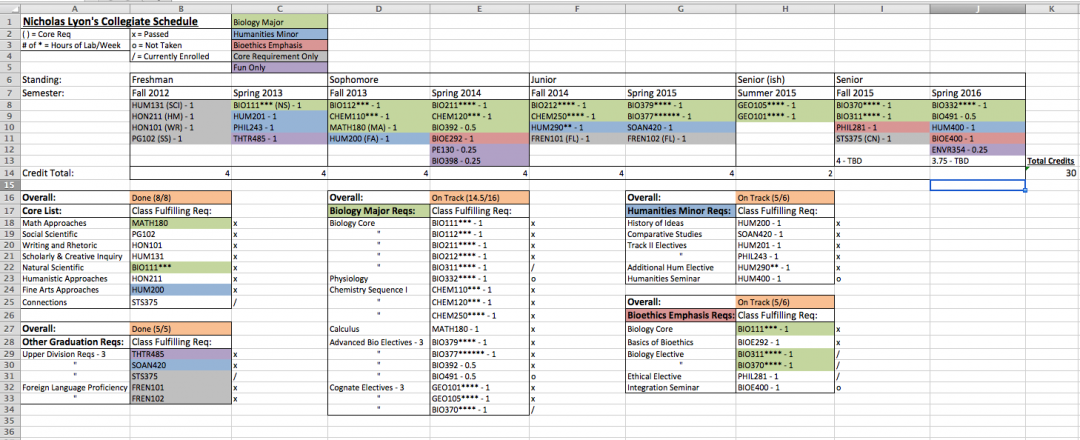Here’s the bad news right now: On top of everything else on your plate as another year of college kicks off, I’m suggesting you’ve got a little more to do. The good news is that I’ve made a four-year roadmap to save you a little time. While I was doing my summer homework and writing the book, Launch Like a Rocket: Build the soft skills you’ll need for your career by leveraging your entire college experience, I created a spreadsheet for you to save as a copy in your Google Drive or download to use in Excel. Since I’m still proofreading the final layout of the book, I’ll just do a quick post to cover the basics of the planning process to be sure you’re one of the few college graduates with the soft skills needed to succeed. For a quick briefing on soft skills, I like the Bloomberg Job Skills Report for 2016, even though they are talking about MBA recruiters’ wish lists for top candidates. (Master of the obvious: If MBA grads don’t have these skills, imagine how rare college grads with them are.)
Soft Skills
Someone recently asked me is I could teach a small group of college-bound high school seniors how to set up their LinkedIn profiles. Funny, because we’d just come out of our monthly Lean In Circle meeting where we went through our profiles one by one and updated them. There are a ton of people blogging in detail about tips and it’s definitely a project to think about that first little intro blurb, but I’m just going to give you a quick checklist of things to do for that new empty little profile and link them to other posts that give you some tips on how to do those things.
This is the time of year when all the college acceptances start pouring in. You may spend April doing some final visits to figure out which school is right for you now. You may not know what you want to major in, but you likely have a couple of alternatives in mind. It’s not too soon to take a look at the classes your possible schools have and start roughing out a plan. (If you know which one you’re going to go to, you can get more detailed from the start.) This will make college a more valuable, productive experience, and any opportunity to practice this kind of planning will be critical to success in your career. Planning your classes yourself and continuing to rough out the plan as new information becomes available will help you graduate on time and save you a ton of money in the process. (The money aspect may make it tempting for parents to take over this spreadsheet, but if you are a parent who really must, at least use it in stealth mode, to prompt your student to double-check their facts. Land the helicopter and walk away.) It may also save you some false starts. For example, some science majors at some schools are not easily compatible with a semester abroad—taking a look now will help you pick the right school and go in to a chosen school aware from the start about any potential trade-offs between your interests.
By way of example, I thought I’d use one my sons’ college experience. To help you drill down into as much of the detail as you like, without my writing too much into the weeds, I’m linking extensively to the University of Puget Sound website throughout. His journey may be very different from what you imagine for yourself, but the twists and turns of his college career are probably far less than the average experience. The point of adolescence, college, and those first few jobs out of college is to help you figure out who you want to be and what you want to do, so you should expect you’ll need to adjust the grand plan constantly. (BTW, the same thing will be true of your career—see the animation in my last post.)
Luckily, my son, Nick, was willing to send me the College Schedule spreadsheet he showed me over the holidays and said I could share it. By way of background, Nick’s a senior at the University of Puget Sound, graduating this May (2016). He was admitted as a freshman with a Humanities minor and as part of the Honors program. Right off, getting accepted to both programs meant he had to take both program-specific freshman writing seminars (on his sheet these are the HUM classes in freshman semester, although they now have different SSI-1 designations in the link above). Our family thought that was a good thing, because while he was a strong writer and coming out of a large, well-regarded public high school, his classes typically had 30–40 students.
Here’s a reality check for the intense planners out there. The hot jobs change over time and some of the things that look like a smart, steady career path when you’re in college can disappear entirely a decade or two longer. Or you can change and decide the things that fascinated you at 19 bore you silly when you are 28. Planning for an unknown future with too many variables to isolate is impossible to do and discouraging to contemplate. And we live in a time of increasingly fast change. Whole industries are being disrupted while new ones arise. So here’s a statement taken out of context that really wouldn’t sound like me: Give up.
I’m proposing an entirely different way to think about your career, starting right now, while you are still in school that future-proofs you, whatever comes. Think of every class and activity as building specific skills, you can begin to create a narrative that helps you decide where your evolving passions lie. You can also plan a few steps ahead, as things gradually become clearer to you. And even those first internships or career positions post-graduation that turn out to be a terrible fit can still yield big value if you think about them in terms of skills. If you’ve got strong skills in a few areas and continue to build on those, I think you’ll be relevant for even those professions that arise from what’s just a sparkle in an entrepreneur’s eye right now. And when you come to a choice between activities, internships, or jobs, you’ll be able to evaluate them by their long-term worth to you, not just a short-term pay difference.
Dan Chambliss and Christopher Takacs followed over 100 students over eight years at Hamilton College to see what works and what doesn’t. They show the reader how college works and see beyond the four years, with frequent commentary from alumni looking back at their college years and with insight into what choices paid off and what opportunities they missed. While they are researchers writing for an academic audience, and the book is a little dry, with more information about background methods than the lay reader wants, the core is a very reliable, persuasive guide to what needs to happen for a successful college experience (and if college isn’t successful, you’re unlikely to have a successful post-college launch, right?)
Interestingly, students don’t need to find a large group of great people—they need just a few—and those can come from nearly anywhere on campus. But those friends are crucial to success on all levels. And, although probably true all through life, it’s interesting to consider that friendships within one group may preclude friendships with other groups—whether due to time constraints or clannishness.
This week I received yet another completely generic, one-line “I’d like to connect with you on LinkedIn” invitation from someone I didn’t know, whose job title is “student at XYZ University.” I admit, I am sometimes uncertain about the invites I get. Not because I am old and forgetful, but because I’ve been working since I was 16—I’ve met a lot of people in my life, from many different circles, and sometimes it’s hard to place them out of context. (And I started my career long before LI was invented, so there are people who suddenly join who knew me quite well years ago.) Giving everyone the benefit of the doubt, when I’m not sure I go check out the profiles of the unknown message senders on LinkedIn. This week’s uninitiated user profile has no photo, and relatively little info, given they are young and with little experience. They aren’t in a field that relates to what I do nor is their school one I have any strong personal connection to (there are two business school scholarships there in my dad’s name, but my last name is different, so I’m dismissing that as the reason.) I’m not accepting the invite and I’ll nicely mark the invite reason as “I don’t know Person X” (the other option is to mark it as spam). If you get too many declines for this reason LinkedIn can restrict or even terminate your account. This is not a happy outcome for this student (who by the way sealed their amateur status by having only 20 connections).
First of all, have a real profile, including a photo, when you are connecting with anyone. Start off by connecting to your classmates, professors, parents, friends’ parents. Try getting to 50 connections. Send invites after you’ve had a successful meeting or email exchange with someone new. If you’ve had only a brief conversation at a large gathering, follow up with an email or coffee invite, not a LI invite. Once you’ve actually met, then follow up with an invite. Give yourself time to get back to your office or the equivalent—at least an hour. Invites sent on your phone from the car five minutes after the meeting are a exclusive hallmark of overly enthusiastic teenagers. Cute, possibly accepted, but not as a peer.
In all cases the highlighting within the pull quote is mine, but just in case you think I’m exaggerating the urgency of the situation, I’d like to show you every so often the kind of statements that jump out at me as I work my through all my daily reading. These links don’t inspire me to a whole post, but I think they serve as proof of concept.
This reiterating the need for soft skills (and the genius of smart informational interviewing) from a senior Deloitte consultant, Elizabeth Lascaze:
(Elizabeth) started interviewing executives she thought she might want to work for one day, asking them where they saw room for improvement in new graduates. Many of them pointed to gaps in leadership ability and in understanding the people impact on an organization.
“As one executive told me,” Lascaze says, “you can teach anybody the technical stuff, but if you don’t know how to galvanize people around a mission, then all you have is a good strategy. That resonated with me and made me want to work in human capital, particularly in helping organizations fulfill their purpose and actually do what they were designed to do.”
And from BloombergBusiness last week, Dean Nick Allard of Brooklyn Law School, with another “wow, they just don’t get it” comment:
In a pinstriped charcoal suit and purple tie, Allard is the most formally dressed person in the classroom. Eighteen Brooklyn Law students are here for a special course to guide them through summer jobs at law offices. One student volunteers that she failed to finish an onerous one-day assignment to summarize a deposition hundreds of pages long. “How did you sleep that night?” Allard asks. Just fine, the student responds, not understanding his implication. “Well, maybe that’s a bad thing,” the dean mutters.
From a short Fortune column with IBM engineer Lisa Seacat DeLuca:
I stopped worrying that I didn’t fit the traditional computer science major profile because I fell in love with the creativity and challenge of technology. I quickly found out that my extra-curricular activities made me unique. Each experience I had outside a dark computer cluster only added to the new perspective I brought to problem solving. There is no cookie-cutter mold of what an engineer looks or acts like.
And why a really diverse group is the best possible team (and why one of my extracurricular suggestions is to be sure you are pulling diverse groups together in at least some of your work):
I have found that assembling a multidimensional group of colleagues is most successful. Recruit and elevate the best people at what they do, while seeking a mix of personalities: analytical, expressive, driven, amiable, energetic, etc. Together, they’ll be a powerful force to be reckoned with. Also, know your own leadership strengths and weaknesses and choose a team that complements them.
I had breakfast today with a friend, Brent Stickels, who is a partner in YYES, an agency with offices in Minneapolis and Los Angeles. During our conversation, he mentioned another ambitious, smart friend who’s currently in a great new job at a company, unfortunately with a very disengaged culture. He’d advised her to get out “before you lose your edge.” I thought that was great advice, and worthy of a post.
When we talk about a group’s culture, there are a lot of ways it can go bad. There are toxic cultures, where there’s actively, aggressively unkind (or illegal) stuff going on and it’s unremarkable. There’s bullying and hazing. People stealing ideas, sabotaging other people’s efforts, or blind to the larger picture. If you’re in a group like this, you need to exit, as soon as possible, with some grace. (I’m not going to touch the recent amazon.com blowup—I don’t have any direct intel—but I’ve been working long enough to tell you that in we’re-working-to-change-the-world conversations we universally love to romanticize an extreme work ethic.)
You don’t have to enter the workforce to encounter a bad culture within a group, it’s on even the most idyllic campus. Hazing isn’t just for the Greek system—other groups can be just as nasty in their rituals, nor are all fraternities guilty of this. Part of college is figuring out who you are and what you stand for. (There is more to these four years than getting a job—a really great school is going to help you learn how to make a life.) You’re going to get a lot to think about in the discussion of big ideas in the classroom and during office hours, but you should also be getting it in your non-academic engagements.
In this world no one rules by love; if you are but amiable, you are no hero;
to be powerful, you must be strong, and to have dominion
you must have a genius for organizing.
—Cardinal Newman
Bringing order to chaos (aka herding cats) is something you’ve been working on all through high school. If you hadn’t been good at it, likely you wouldn’t be in college right now. And if you’re working your way through school, you already know even more about this one. It’s hard to get control of all the variables in your life. In the working world you’ll need to get your variables and a lot of other people’s to synchronize in order to get things done.
College shelters you a bit from creating time management from scratch—you don’t have to propose meeting times for your classes, locate the various required books and materials from multiple sources,* or find a place to meet and a way to pay the professor. But you’re picking classes that combine into a set of major/minor and general graduation requirements as well as addressing your intellectual curiosity for new subjects. Each semester’s picks fit into the reality that you can only be in one place at one time, prerequisites completion, and physical constraints (you need a enough time to make it from one end of campus to another—even in snow or 105-degree heat) and trying to wrap it all up on the desired four-year schedule. This isn’t something that specifically goes on a resume (although I do see “graduated in three years” noted from time to time and I get the subtext, although perhaps only because I graduated early, too.). Be aware of the skills you’re building—and make sure you are working on these. As college progresses shove your parents out of the process, involve your advisors for advice and as sounding boards, but don’t look to them to move in as replacement helicopter parents. Parents: Start pushing your student to take control. By senior year you shouldn’t be managing anything. Even if you’re underwriting college, you shouldn’t even be making plane reservations. No one in the office will be doing this for your student—they have to learn now, even if they are “too busy.” Move them in freshman year, but unless you’re close and they have no other options don”t move them out or back in. they need to navigate these basic things on their own. Time management, both in the sort- and long-term, is a skill you’ve got to get down.
Build on those time skills, and start organizing other people.
Half the world is composed of people who have something to say and can’t,
and the other half who have nothing to say and keep on saying it.
—Robert Frost
Let’s assume you’re in the half that has something to say. You’re used to just saying it, but you’ve experienced a fairly forgiving audience—your peers, professors, and parents. (You are already used to competing with the electronics in the audience’s hands–that’s a good skill.) Out here in the real world it’s a whole new game. Everyone is strapped for time, so you’ve got to be concise. Everyone is juggling a lot of different roles and responsibilities: You’ve got to hit the audience at the right time. There can be a lot of different audiences so the words and venues you use may well be different for peers, upper management, and outside audiences. You need to practice to be good at these things. Work with similar groups on campus and get experience with a less safe audience or start asking a friendly group for feedback. (Ask your parents a serious question where they get to help with your future—they’ll be thrilled. Unless you have recovering helicopter parents—more on that in a future post.) In the interest of cutting to the chase: I’ve created a short list of the things you need to consider in communicating with other people and I’ve added context with the kinds of opportunities I think you can find on your campus.









